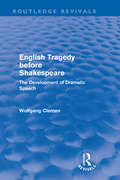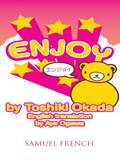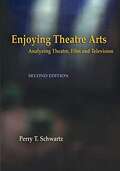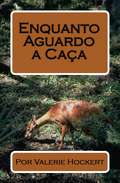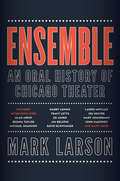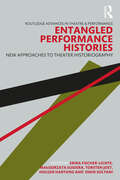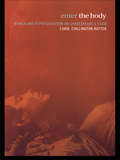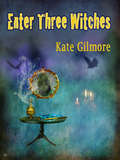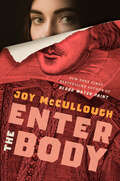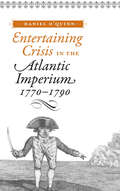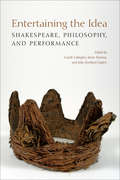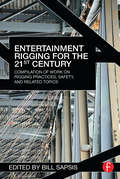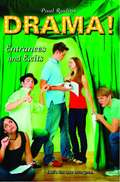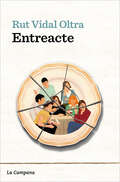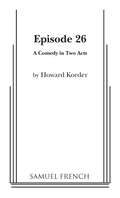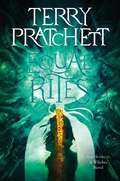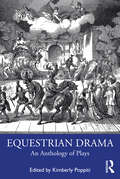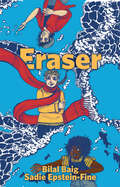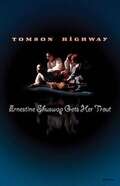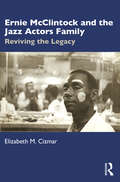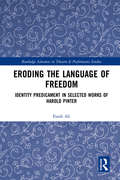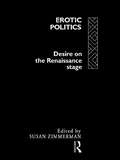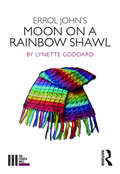- Table View
- List View
English Tragedy before Shakespeare: The Development of Dramatic Speech (Routledge Revivals)
by Wolfgang ClemenFirst published in English in 1961, this reissue relates the problems of form and style to the development of dramatic speech in pre-Shakespearean tragedy. The work offers positive standards by which to assess the development of pre-Shakespearean drama and, by tracing certain characteristics in Elizabethan tragedy which were to have a bearing on Shakespeare’s dramatic technique, helps to illuminate the foundations on which Shakespeare built his dramatic oeuvre.
Enjoy
by Toshiki OkadaCharacters: 6 male, 4 female Minimal Set From acclaimed Japanese director/playwright Toshiki Okada, Artistic Director of the internationally-lauded chelfitsch Theatre Company, comes a chronicle of post-college ennui and 21st Century relationships in Japan's Lost Generation. The static lives of several self-obsessed GenX comic book store clerks are thrown out of balance by the presence of a younger female co-worker, who rightly makes them question the meaning of their lives in a shifting socio-economic landscape. Written in the hyper-colloquial style Okada has become famous for, this play is presented for the first time in English in a translation by Japanese American playwright Aya Ogawa, and was met with massive critical praise upon its New York premiere. "Listless characters translate easily to a different culture, the blunt colloquial language elevates this drama into something more daring... Distinguished by a style that turns inarticulateness into the sort of poetry that rewards close listening. Mr. Okada, with the help of a very deft translation by Aya Ogawa, makes sure that even if it take a while to communicate a thought, a mood of indulgence and despair emerges clearly." - The New York Times "Toshiki Okada's new play deserves the attention of a major theatrical event. Meditations on age, failure, and finance read clearly as existentialism for the reigning recession. Like the best works of the theater of the absurd, Enjoy turns its humility into philosophy." - Backstage
Enjoying Theatre Arts: Analyzing Theatre, Film and Television
by Perry T. SchwartzEnjoying Theatre Arts uses examples from Theatre, Film and Television to develop the unique analysis system detailed in this book. The text is designed as an introduction for students of the theatre arts as well as the general audience member. Contents Part One - The Theory And Analysis Art in Theatre Arts Aristotle's Six Elements of Drama Genre Based Narrative Structure Analysis Part Two - The Artistic Side Criticism The Writer The Director The Actor The Designers Part Three - The Business Side The Producer Film, Theatre, Television Business Structure The Artist/Craftsman and the Business.
Enquanto Aguardo a Caça
by Valerie HockertEnquanto George senta em seu suporte de árvore, ele pensa sobre as coisas e, em seguida sua mente se questiona a cada movimento que vê e associa a pessoas e situações em sua própria vida. Sua esposa, seus filhos, seu casamento, seus amigos, seu trabalho, todos estão inclusos na reflexão. O que aconteceu com minha vida? George se pergunta enquanto senta ali. Sua vida obviamente não está onde deveria; ele não está onde deveria. E aqui está ele—sentado em um suporte de árvore aguardando o veado perfeito, quando deveria estar….
Ensemble: An Oral History of Chicago Theater
by Mark LarsonThis definitive history brings Chicago’s celebrated theater and comedy scenes to life with stories from some of its biggest stars spanning sixty-five years.Chicago is a bona fide theater town, bursting with vitality that thrills local fans and produces generation after generation of world-renowned actors, directors, playwrights, and designers. Now Mark Larson shares the rich theatrical history of Chicago through first-person accounts from the people who made it.Drawing from more than three hundred interviews, Larson weaves a narrative that expresses the spirit of Chicago’s ensemble ethos: the voices of celebrities such as Julia Louis-Dreyfus, Ed Asner, George Wendt, Michael Shannon, and Tracy Letts comingle with stories from designers, composers, and others who have played a crucial role in making Chicago theater so powerful, influential, and unique.Among many other topics, this book explores the early days of the fabled Compass Players and the legendary Second City in the ‘50s and ‘60s; the rise of acclaimed ensembles like Steppenwolf in the ‘70s; the explosion of storefront and neighborhood companies in the ‘80s; and the enduring global influence of the city as the center of improv training and performance.
Entangled Performance Histories: New Approaches to Theater Historiography (Routledge Advances in Theatre & Performance Studies)
by Erika Fischer-Lichte Holger Hartung Torsten Jost Omid Soltani Małgorzata SugieraEntangled Performance Histories is the first book-length study that applies the concept of "entangled histories" as a new paradigm in the field of theater and performance historiography. "Entangled histories" denotes the interconnectedness of multiple histories that cannot be addressed within national frameworks. The concept refers to interconnected pasts, in which historical processes of contact and exchange between performance cultures affected all involved. Presenting case studies from across the world—spanning Africa, the Arab-speaking world, Asia, the Americas and Europe—the book’s contributors systematically expand, exemplify and examine the concept of "entangled histories," thus introducing various innovative concepts, theories and methodologies for investigating reciprocally consequential processes of interweaving performance cultures from the past. Bringing together examples of entanglements in theater and performance histories from a broad variety of geographical and historical backgrounds, the book’s contributions build together a broad basis for a possible and necessary paradigmatic shift in the field of theater and performance historiography. Ideal for researchers and students of history, theater, performance, drama and dance, this volume opens novel perspectives on the possibilities and challenges of investigating the entangled histories of theater and performance cultures on a global scale.
Enter The Body: Women and Representation on Shakespeare's Stage
by Carol Chillington RutterEnter the Body offers a series of provocative case studies of the work women's bodies do on Shakespeare's intensely body-conscious stage. Rutter's topics are sex, death, race, gender, culture, politics, and the excessive performative body that exceeds the playtext it inhabits. As well as drawing upon vital primary documents from Shakespeare's day, Rutter offers close readings of women's performance's on stage and film in Britian today, from Peggy Ashcroft's (white) Cleopatra and Whoopi Goldberg's (whiteface) African Queen to Sally Dexter's languorous Helen and Alan Howard's raver 'Queen' of Troy.
Enter Three Witches
by Kate GilmoreBren wondered, but not for long, why his normally cheerful, easy-going life had suddenly begun to seem hopelessly complicated. He was learning to run the lights for his school's production of Macbeth, but that was fun, and so was almost everything about his first serious relationship--everything except the fact that he couldn't bring his girl friend home. Bren had never really minded living with three witches, but now he did. How could he explain that his beautiful mother spent hours casting spells in her bat-haunted tower room while his grandmother told fortunes to paying customers in the living room and their housekeeper raised black chickens in the garden apartment for uses it was best not to contemplate? His father, after getting up in the morning to find a baby bat in his shoe and a python in his shirt drawer--the culmination of a long series of such events--had exchanged the spacious old house for a simple, brick box on the East side.To make matters worse, Bren learned that Erika, his girl, had been cast as First Witch in Macbeth, so now he felt himself to be wallowing in witches. She was also not one to take no for an answer and soon bent an agile mind to unraveling the mystery of Bren's family. When on opening night only Erika saw three figures outlined in blue fire at the balcony rail, the amazing technical effects that followed were explained, if only to her."One of the most intelligently funny young-adult fantasies to come out in years..."--2/LOCUS May 1991"The combination of first romance and magic is a dynamic one, and Gilmore nimbly carries off the blend with wit and grace."--Booklist, starred review
Enter the Body
by Joy McCullough&“At once tender, poetic and ferocious, Enter The Body breathes new life into the Bard&’s most tragic heroines. More than a tribute to Shakespeare, this kaleidoscopic, ambitious novel-in-verse gives Juliet, Ophelia, Cordelia, and Lavinia the chance to tell their own stories full of passion, justice, sisterhood, and love. Simply spectacular.&”—Michael L. Printz Award winner Laura Ruby, author of Bone GapIn the room beneath a stage's trapdoor, Shakespeare&’s dead teenage girls compare their experiences and retell the stories of their lives, their loves, and their fates in their own words. Bestselling author Joy McCullough offers a brilliant testament to how young women can support each other and reclaim their stories in the aftermath of trauma.
Entertaining Crisis in the Atlantic Imperium, 1770–1790
by Daniel O'QuinnHonorable Mention, 2012 Joe A. Callaway Prize in Drama and TheaterFirst Place, Large Not-for-Profit Publisher, Typographic Cover, 2011 Washington Book Publishers Design and Effectiveness AwardsLess than twenty years after asserting global dominance in the Seven Years' War, Britain suffered a devastating defeat when it lost the American colonies. Daniel O'Quinn explores how the theaters and the newspapers worked in concert to mediate the events of the American war for British audiences and how these convergent media attempted to articulate a post-American future for British imperial society.Building on the methodological innovations of his 2005 publication Staging Governance: Theatrical Imperialism in London, 1770-1800, O’Quinn demonstrates how the reconstitution of British imperial subjectivities involved an almost nightly engagement with a rich entertainment culture that necessarily incorporated information circulated in the daily press. Each chapter investigates different moments in the American crisis through the analysis of scenes of social and theatrical performance and through careful readings of works by figures such as Richard Brinsley Sheridan, William Cowper, Hannah More, Arthur Murphy, Hannah Cowley, George Colman, and Georg Friedrich Handel. Through a close engagement with this diverse entertainment archive, O'Quinn traces the hollowing out of elite British masculinity during the 1770s and examines the resulting strategies for reconfiguring ideas of gender, sexuality, and sociability that would stabilize national and imperial relations in the 1780s. Together, O'Quinn's two books offer a dramatic account of the global shifts in British imperial culture that will be of interest to scholars in theater and performance studies, eighteenth-century studies, Romanticism, and trans-Atlantic studies.
Entertaining the Idea: Shakespeare, Performance, and Philosophy (UCLA Clark Memorial Library Series)
To entertain an idea is to take it in, pay attention to it, give it breathing room, dwell with it for a time. The practice of entertaining ideas suggests rumination and meditation, inviting us to think of philosophy as a form of hospitality and a kind of mental theatre. In this collection, organized around key words shared by philosophy and performance, the editors suggest that Shakespeare’s plays supply readers, listeners, viewers, and performers with equipment for living. In plays ranging from A Midsummer Night’s Dream to King Lear and The Winter’s Tale, Shakespeare invites readers and audiences to be more responsive to the texture and meaning of daily encounters, whether in the intimacies of love, the demands of social and political life, or moments of ethical decision. Entertaining the Idea features established and emerging scholars, addressing key words such as role play, acknowledgment, judgment, and entertainment as well as curse and care. The volume also includes longer essays on Shakespeare, Kant, Husserl, and Hegel as well as an afterword by theatre critic Charles McNulty on the philosophy and performance history of King Lear.
Entertainment Rigging for the 21st Century: Compilation of Work on Rigging Practices, Safety, and Related Topics
by Bill SapsisFrom the basics of physical forces and mathematical formulas to performer flying and stage automation, Entertainment Rigging for the 21st Century provides you with insider information into rigging systems and the skills you need to safely operate them. Over the past decade, the entertainment industry has witnessed major changes in rigging technology, as manually operated rigging has given way to motorized systems in both permanent and touring productions, and greater attention has been paid to standardizing safety practices. This book leads you through what is currently happening in the industry, why it’s happening, and how. Accessible for riggers and non-riggers alike, it contains details on the technology and methodology used to achieve the startling effects found in concerts and stage shows. With a foreword written by Monona Rossol, this text contains contributions from industry leaders including: Rocky Paulson Bill Gorlin Tray Allen Roy Bickel Keith Bohn Karen Butler Stuart Cox Bill Sapsis Dan Culhane Eddie Raymond Chris Higgs Carla Richters Joe McGeough Scott Fisher
Entrances and Exits
by Paul RuditisIt's time for the Fall One-Act Festival, and Hope gets the honored privilege of debuting her very first original play! With Bryan directing and Jason and Sam as the leads, it seems as if nothing could go wrong with this dream team of talent. But where's the fun in that? Enter Sam and Jason's onstage chemistry that's so hot, it's working overtime offstage! Course, Sam's real-life beau, Eric isn't so cool with that. And what about Bryan? With his sexual orientation public knowledge, he's gaining some admiring attention from the most unexpected people. Can you blame them? With all these raging hormones, it'll be a wonder if the play goes off at all. And the after party? Please - that'll be a show all in itself...
Entreacte
by Rut Vidal OltraUna novel·la esperpèntica, divertida, que narra els embolics d'una família en la qual res és el que sembla. La Sofia organitza una trobada amb els seus quatre fills a la casa d'estiueig de l'Empordà per escampar les cendres del pare, un reconegut director de teatre, i llegir el seu testament. El cap de setmana, però, es converteix en una trobada tensa a causa dels secrets que amaguen els membres de la família, les enveges que traspuen, les confessions que es revelen i els retrets inevitables que sorgeixen quan finalment el notari, un amic de la família, obre el testament i llegeix les últimes voluntats del pare. «Va baixar al menjador desitjant no trobar-se ningú. Havia de pensar quina estratègia li calia seguir i necessitava un cafè per fer-ho. Si ho destapava tot, la Sofia sabria que s'havia separat i que ho havia amagat. Això podia ser un drama en tres actes i no estava disposada a aguantar-ho. Si no deia res, s'hauria de menjar els punys davant de l'Eva. Com podia ser tan truja, la seva germana?».
Environmental Degradation in Jacobean Drama
by Bruce BoehrerIn Environmental Degradation in Jacobean Drama, Bruce Boehrer provides the first general history of the Shakespearean stage to focus primarily on ecological issues. Early modern English drama was conditioned by the environmental events of the cities and landscapes within which it developed. Boehrer introduces Jacobean London as the first modern European metropolis in an England beset by problems of overpopulation; depletion of resources and species; land, water and air pollution; disease and other health-related issues; and associated changes in social behavior and cultural output. In six chapters he discusses the work of the most productive and influential playwrights of the day: Shakespeare, Jonson, Middleton, Fletcher, Dekker and Heywood, exploring the strategies by which they made sense of radical ecological change in their drama. In the process, Boehrer sketches out these playwrights' differing responses to environmental issues and traces their legacy for later literary formulations of green consciousness.
Episode 26
by Howard KorderComedy / 7m, 2f / Remember those glorious days of Saturday morning sci fi serials at the local bijou: Buck Rogers and Flash Gordon. Here is an affectionate and extremely ingenious send up of the genre. Our hero is Buzz Gatecrasher and he finds himself on the Planet Darvon with our sweetheart and his, Hillen Dale, and with Dr. Art Deco, the obligatory dotty scientist. Darvon is ruled by Vaknor, a cross between Darth Vader, Ming the Merciless and Dracula, who fancies himself Emperor of the Universe. With the help of Arno, the winged King of the Hawk People, Buzz vanquishes Vaknor and saves the universe only to be reminded by the announcer that we all have to tune in next week for Episode 27!
Equal Rites: A Discworld Novel (Witches #1)
by Terry Pratchett“Unadulterated fun. . . witty, frequently hilarious.”—San Francisco ChronicleChaos and hilarity ensue when a young woman becomes the first female wizard, upending the Discworld in this bitingly funny tale from internationally bestselling author Sir Terry Pratchett.A little knowledge is a dangerous thing, but it’s not half so bad as a lot of ignorance.Everyone knows there’s no such thing as a female wizard. So when a dying wizard accidentally passes on his staff of power to an eighth daughter of an eighth son, the exclusively masculine world of wizarding is thrown into a tailspin.Eskarina isn’t afraid of male critics and she isn’t going to relinquish this unexpected gift. With a little hocus pocus from Granny Weatherwax, the Discworld’s most infamous witch (an old crone who has plenty of experience ignoring the status quo), Esk infiltrates the magical Unseen University and befriends another apprentice, a wizard named Simon.But power is unpredictable, and these bright young students soon find themselves in a whole new dimension of trouble. . . .The Discworld novels can be read in any order but Equal Rites is the first book in the Witches collection. The Witches collection, in order, include:Equal RitesWyrd SistersWitches AbroadLords and LadiesMaskeradeCarpe Jugulum
Equestrian Drama: An Anthology of Plays
by Kimberly PoppitiEquestrian Drama: An Anthology of Plays is a collection of four representative equestrian dramas. It includes four annotated plays: Timour the Tartar by Matthew G. Lewis, The Battle of Waterloo by J. H. Amherst, Mazeppa by Henry M. Milner, and The Whip by Henry Hamilton and Cecil Raleigh. An introduction precedes the collection, providing the information necessary to understand and contextualize the genre and the plays as both written and performance texts, and within the time period of their original productions, as well as within the larger histories of theatre and equestrian entertainments. Additional related plays are identified, excerpted, and explored, providing readers with a wide range of examples to better understand the development and significance of this unique form of popular theatre. Also identified and explored are significant contributions made to stage technology and design by the patented stage machinery designed for the production of the mechanized form of equestrian drama, which became popular in the late nineteenth century. Equestrian Drama is suitable for undergraduate, graduate, and professional students in theatre history, dramatic literature, performance studies, and equine studies. An online supplement to this book is available to provide readers with additional content relating to this collection, including original English language translations of La Fille Hussard and Rognolet and Passe-Carreau, as well as the full annotated text of Turpin's Ride to York.
Eraser
by Bilal Baig Sadie Epstein-FineAn immersive experience, Eraser delves into the memories and fantasies of a classroom of students as they figure out who they want to be. Six students guide readers through their different journeys, taking them along to the cafeteria, change rooms, and playground, to the places where they feel safest and the most brave, vulnerable, and afraid. Afroze just moved to Canada from Pakistan and is struggling to fit in as a white-skinned gender-questioning convert to Islam. All Jihad wants is to be cool, but he struggles with the appearance of this new student who doesn’t look like any of the Muslims he knows. Noah’s brother just died, and he’s been avoiding processing his grief, which makes him lash out at his best friend, Eli. Eli doesn’t know how to support Noah, who he also harbours questioning feelings for. Whitney wants to live by her own rules in her own imaginary world, but she’s forced to deal with annoying kids like Tara. Tara loves school and getting straight As, but all the pressure she feels eventually adds up and she crumbles. Finding a balance between tough realities and honest fantasies, Eraser is an energetic and sentimental look at what it’s like to navigate differences and connections as a kid.
Ernestine Shuswap Gets Her Trout
by Tomson HighwayBased on a deposition signed by 14 Chiefs of the Thompson River basin on the occasion of a visit to their lands by Canadian Prime Minister Sir Wilfrid Laurier in 1910, Ernestine Shuswap Gets Her Trout is a ritualized retelling of how the Native Peoples of British Columbia lost their fishing, hunting and grazing rights, their lands, and finally their language without their agreement or consent, and without any treaties ever having been signed. It is one of the most compellingly tragic cases of cultural genocide to emerge from the history of colonialism, enacted by four women whose stories follow each other like the cyclical seasons they represent. <p><p> Written in the spirit of Shuswap, a Trickster language” within which the hysterically comic spills over into the unutterably tragic and back, this play is haunted by the blood of the dead spreading over the landscape like a red mist of mourning.
Ernie McClintock and the Jazz Actors Family: Reviving the Legacy
by Elizabeth M. CizmarErnie McClintock and the Jazz Actors Family is a critical biography examining the life and work of Ernie McClintock, the founder of the Jazz Acting Method and 1997 recipient of the Living Legend Award from the National Black Theatre Festival, whose inclusive contributions to acting and actor training have largely remained on the fringes of scholarship and practice. Based on original archival research and interviews with McClintock’s students and peers, this book traces his life from his childhood in Chicago to Harlem in the 1960s at the height of the Black Arts Movement, to Richmond, Virginia in 2003, paying particular attention to his Black Power–influenced, culturally specific acting theory and versatile Black theatrical productions. As a biographical study, this book establishes McClintock as a leading figure of the Black Theatre Movement, proven by the Jazz Acting technique, his critically acclaimed productions, and his leadership positions in organizations such as the Black Theatre Alliance. Ernie McClintock and the Jazz Actors Family explores how the Jazz Acting technique was applied in productions such as N.R. Davidson’s El Hajj Malik, Derek Walcott’s Dream on Monkey Mountain, Cheryl West’s Before It Hits Home, Endesha Mae Holland’s From the Mississippi Delta, and many collectively-authored pieces. The book also investigates why he has been excluded from dominant theatre histories, especially considering how, as a gay Black man, he persistently defied the status quo, questioning practices of administrators of theatres and mainstream theatrical standards. Ernie McClintock and the Jazz Actors Family is situated at the intersection of Black acting theory, Black Arts Movement history, and Black queer studies, and is an illuminating study of an important figure for actors, acting teachers, acting students, and cultural historians. This is an essential resource for readers who are seeking histories and approaches outside of a white, straight, Eurocentric framework.
Ernie McClintock and the Jazz Actors Family: Reviving the Legacy
by Elizabeth M. CizmarErnie McClintock and the Jazz Actors Family is a critical biography examining the life and work of Ernie McClintock, the founder of the Jazz Acting Method and 1997 recipient of the Living Legend Award from the National Black Theatre Festival, whose inclusive contributions to acting and actor training have largely remained on the fringes of scholarship and practice.Based on original archival research and interviews with McClintock’s students and peers, this book traces his life from his childhood in Chicago to Harlem in the 1960s at the height of the Black Arts Movement, to Richmond, Virginia in 2003, paying particular attention to his Black Power–influenced, culturally specific acting theory and versatile Black theatrical productions. As a biographical study, this book establishes McClintock as a leading figure of the Black Theatre Movement, proven by the Jazz Acting technique, his critically acclaimed productions, and his leadership positions in organizations such as the Black Theatre Alliance. Ernie McClintock and the Jazz Actors Family explores how the Jazz Acting technique was applied in productions such as N.R. Davidson’s El Hajj Malik, Derek Walcott’s Dream on Monkey Mountain, Cheryl West’s Before It Hits Home, Endesha Mae Holland’s From the Mississippi Delta, and many collectively-authored pieces. The book also investigates why he has been excluded from dominant theatre histories, especially considering how, as a gay Black man, he persistently defied the status quo, questioning practices of administrators of theatres and mainstream theatrical standards.Ernie McClintock and the Jazz Actors Family is situated at the intersection of Black acting theory, Black Arts Movement history, and Black queer studies, and is an illuminating study of an important figure for actors, acting teachers, acting students, and cultural historians. This is an essential resource for readers who are seeking histories and approaches outside of a white, straight, Eurocentric framework.
Eroding the Language of Freedom: Identity Predicament in Selected Works of Harold Pinter (Routledge Advances in Theatre & Performance Studies)
by Farah AliLet down by the uncertainties of memory, language, and their own family units, the characters in Harold Pinter’s plays endure persistent struggles to establish their own identities. Eroding the Language of Freedom re-examines how identity is shaped in these plays, arguing that the characters’ failure to function as active members of society speaks volumes to Pinter’s ideological preoccupation with society’s own inadequacies. Pinter described himself as addressing the state of the world through his plays, and in the linguistic games, emotional balancing acts, and recurring scenarios through which he put his characters, readers and audiences can see how he perceived that world.
Erotic Politics: The Dynamics of Desire in the Renaissance Theatre
by Susan ZimmermanIdentifying the stage as a primary site for erotic display, these essays take eroticism in Renaissance culture as a paradigm for issues of sexuality and identity in early modern culture. Contributors examine how the Renaissance stage functioned as a decoder for erotic experience, both reinforcing and subverting expected sexual behaviour. They argue that the dynamics of theatrical eroticism served to deconstruct gender definitions, leaving conventional categories of sexuality blurred, confused - or absent. In seeking to reposition the conventions and subversions of gender and desire in terms of one another, these essays open up an attractive and distinctive perspective in cultural debate.
Errol John's Moon on a Rainbow Shawl (The Fourth Wall)
by Lynette GoddardErrol John wrote Moon on a Rainbow Shawl (1958) after becoming disillusioned about the lack of good roles for black actors on the British theatre scene. While this situation has only slightly improved since, his response has become the most revived black play in Britain, from its original production at the Royal Court in 1958, to the National Theatre in 2012. It depicts the lives of a black community living in poverty in a shared tenement yard in Port of Spain, Trinidad, in the mid-1940s, showing how each of the characters carries dreams of escaping to create better lives for themselves and their families. Lynette Goddard focuses on how the play articulates the narratives of migration that prompted many Caribbean people to uproot from their homes on the islands and move to the England in the post-war era. For some of them, these dreams of a new life became a reality, but they were experienced differently across genders and generations.
